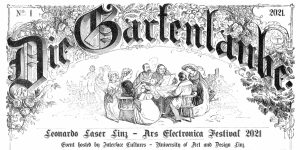Academy of Thoughts

Hybrid Futures
Christiana Kazakou (UK), Dr. Christoph Thun-Hohenstein (AT), Dr. Monica Gagliano (IT), Dr. Martin Pfosser (AT), Leisenhof Gärtnerei Linz (AT), Mag. Gabriele Winkler (AT), Dr. Christa Sommerer (AT), Fabricio Lamoncha (ES)
In September 2021, Linz is joining the Leonardo Art & Science Evening Rendezvous (LASER) network. This international program brings together artists, scientists, scholars and the general public for inspiring presentations and conversations. The LEONARDO LASER LINZ, hosted by the Interface Cultures department at the University of Art and Design Linz, will be held during the Ars Electronica 2021 Festival.

Action Please
Martín Nadal (ES)
Hidden under its appearance of a mobile phone charger, FANGØ takes control of the smartphone it is plugged in, generating random interactions that add a layer of noise to disrupt the mechanics of surveillance capitalism. In the talk we will introduce the concept of surveillance capitalism and the concept of obfuscation, which consists in the production, inclusion, addition, or communication of misleading, ambiguous, or false data in an effort to evade, distract, or confuse data gartherers or diminish the reliability (and value) of data aggregations.

Critical Data
Martin Zeilinger (AT/UK)
Are we witnessing a coming of “creative AI,” and the emergence of a data science that will overcome the existential perils of the Anthropocene? Or is AI, as some are warning, about to emancipate capital from humanity (rather than the other way around)? Building on the concept of algorithmic adjudication and its manifestations in tools such as AI-based digital rights management systems, this talk explores tactical uses of AI through which artists critique and disrupt the outsourcing of codified decision-making to computational agency.

On Interaction
Karmen Franinović (CH), Joelle Bitton (FR), Roman Kirschner (AT), Gerhard M. Buurman (DE)
Around 2000, several interaction design programs were launched around the world. Along with London, New York and Ivrea, Zürich University of the Arts has launched its educational and research activities in this emerging field. We began with a motivation to humanize digital technologies and make them more inclusive and accessible. Two decades later, pressing environmental, social, and political challenges demand that we adapt and expand our focus to encompass worlds and interests other than only those of humans. We invite you to join us in reflecting on the critical and investigative role of interaction design in our society, today and over the past decades.

